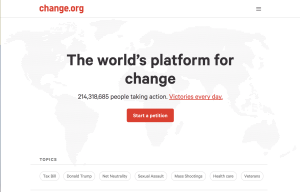Noah Cohen
Editor-in-Chief
We live in the modern age. As a result, nearly all areas of human life have changed to embrace new technology. This includes the actions of protest and petition. Activists have taken advantage of the mass communicative power of social media to spread their messages to the masses. Websites like the popular change.org specialize in the spreading of online petitions. Change.org specifically sends statements of protest to lawmakers and corporate owners with the intent to change their perspective on their respective issues. Change.org alone proudly states that, “More than 100 million people in 196 countries are creating change in their communities.” This incredible movement can be seen all over social media, as it is quite popular to repost petitions of interest. But the question that must be asked is whether or not these petitions actually create a positive change in the world.

A New York Times author gives an example of an online petition to overturn the outcome of the 2016 United States Presidential Election by abolishing the Electoral College. Created by a man named Daniel Brezenoff, the petition raised over a quarter of a million dollars. Nonetheless, the petition was, of course, unsuccessful. Even though policy had not been changed in that case, the effort may not have been in vain. Daniel Carpenter of the Washington Post, claims that “perhaps the main effect of a petition is not persuading its target, but recruiting new people to a cause.” If this is the case, then online petitions can be seen as successful due to the incredible power of communication. However, the same Washington Post article quotes a study that states that “signing something electronically inspires less emotional commitment to a cause than signing by hand.” Would this mean that online petitions in fact are not even very influential to the people who sign them? Could they leave as much of an impression on the signer as liking a friend’s instagram picture?
In a Huffington Post article, the author states that “Since 2011, the White House has responded to more than 200 online petitions, according to the [Obama] administration’s blog, and has seen a 360 percent growth rate in the number of users participating in its digital activism platform.” Unlike calling your local representative, it is doubtful that these petitions have ever changed a politician’s decision. In terms of changing the opinions of lawmakers, no online petition has shown to be very effective, especially in national political decisions. While this is a known case, Milken students frequently share online petitions of many kinds to their various social media accounts. It has become commonplace to take thirty seconds out of one’s day to sign one of them. It is not The Roar’s intention to dissuade students from sharing petitions, but it is important to analyze the impact that sharing them can, or cannot, have. While it is a way to express political opinions, it is doubtful that these petitions actually can make the change that they promise.
Do you think online petitions are effective? Should Milken students continue to share them? Let us know in the comments.



